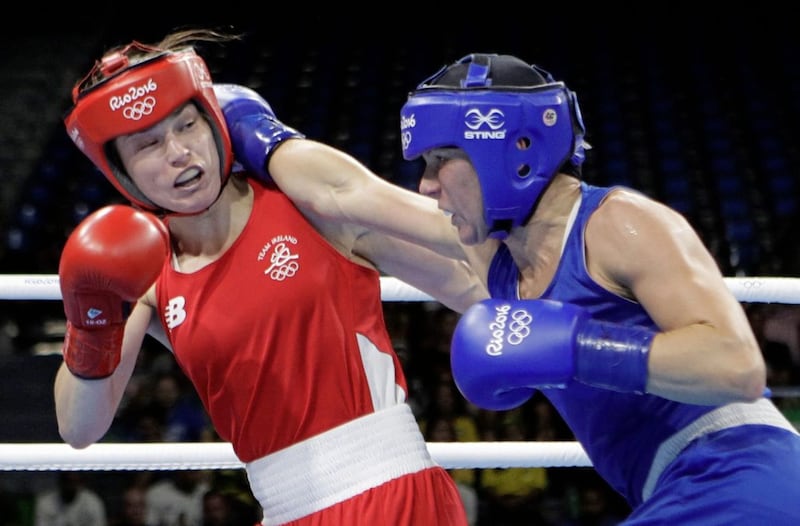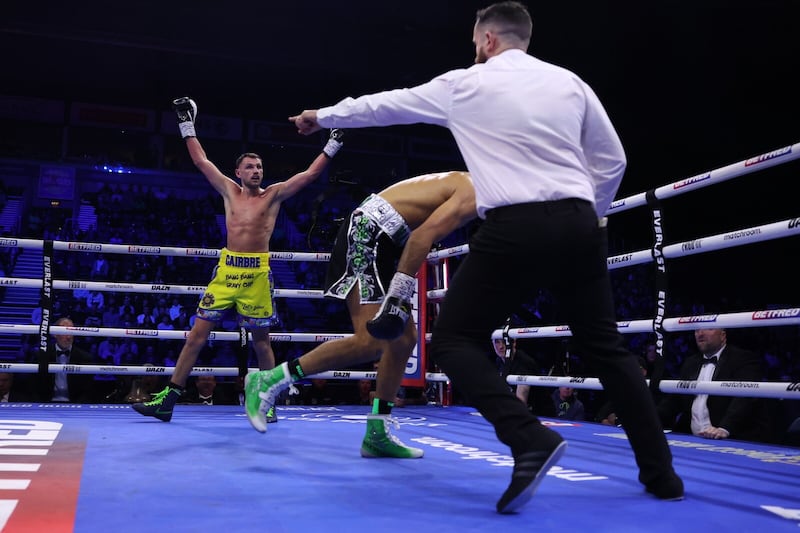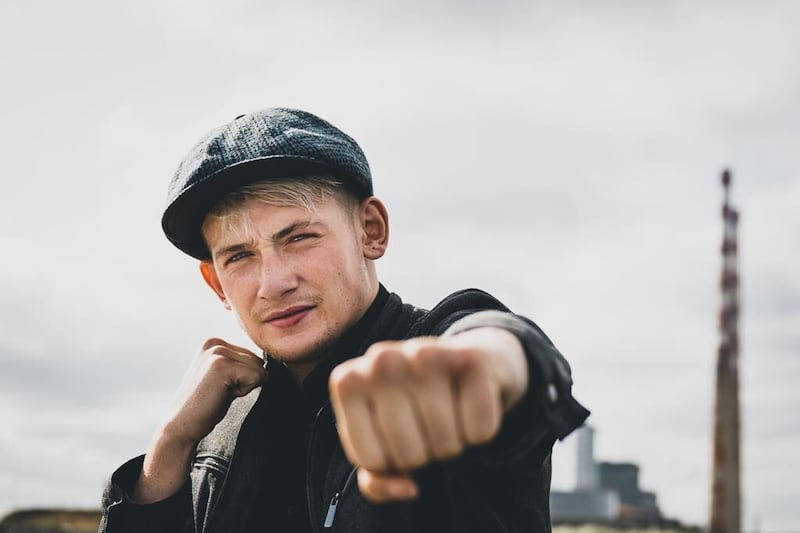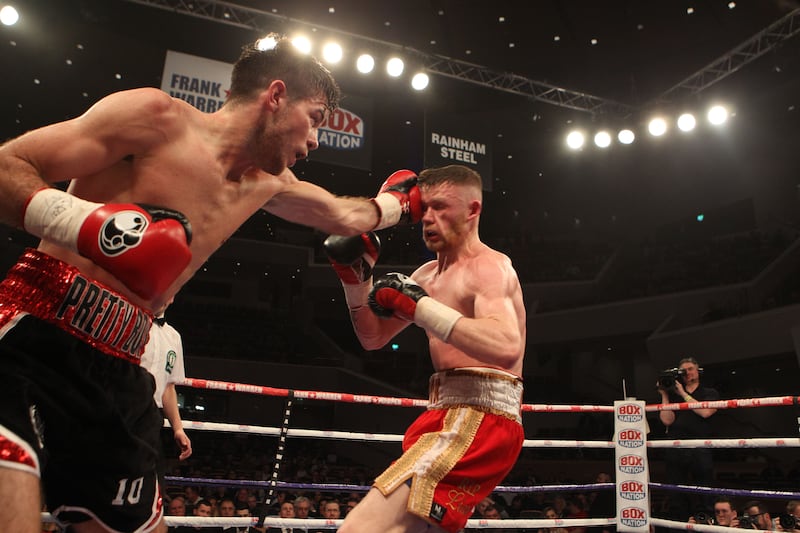IRELAND will send a team to the upcoming men’s World Elite Championships after all – but it remains to be seen how many Irish boxers will travel to Serbia later this month.
It is now a fortnight until the action gets under way, with the championships taking place in Belgrade from October 26 until November 6.
And, until yesterday, it remained unclear whether there would be any Irish representation after a week of speculation followed the finals of the Irish Elite Championships.
However, The Irish News understands that a team will be going to the Serbian capital, subject to further evaluation at a week-long training camp in Sheffield, which includes Great Britain, France and Germany.
With none of the boxers who travelled to the Olympic Games in Tokyo competing at last month’s national championships, or in the mix for the Worlds, two-time Irish Elite champions Kieran Molloy, Gabriel Dossen and Brandon McCarthy are among the more experienced members of the current crop, alongside 2012 Olympian Darren O’Neill, who came out of exile to land the 86 kilo crown.
In the 67kg final, 24-year-old Eugene McKeever demonstrated his progression with a comprehensive victory over Wayne Kelly, who competed at the 2019 World Championships in Ekaterinburg.
Featherweight Adam Hession and heavyweight Jack Marley both proved their credentials on the international stage with medal-winning performances at the European 2022 championships back in May.
Alongside McKeever as first-time Irish Elite winners earlier this month were Letterkenny’s Paddy McShane, Star’s two-time Ulster Elite champion John Paul Hale, Kelyn Cassidy (Saviours Crystal, Waterford) and Ricky Nesbitt (Holy Family, Drogheda).
The Irish Athletic Boxing Association sent a relatively inexperienced team of seven boxers to the World Championships two years ago, with Regan Buckley, Kurt Walker, Wayne Kelly, Aidan Walsh, Michael Nevin, Kane Tucker and Kiril Afanasev all selected.
Last week’s drama began after the Irish Elite champions were invited to attend the High Performance unit in Abbotstown for a week’s assessment the Monday after having their hand raised at the National Stadium.
However, they were informed during the week that Ireland would not be sending a team to the Worlds. The last time Ireland didn’t send a team to the men’s World Championships was in 1978 – when they were also held in Belgrade.
As well as the opportunity to represent their country at the top level, this year’s Worlds also offers fighters the incentive of an overall $2.6 million prize fund, with gold medallists receiving $100,000, silver medalists $50,000, and bronze medalists $25,000.
It is understood there were concerns within the High Performance unit that some members of the prospective squad didn’t have enough experience to make the step up to elite international in such a short space of time.
The Irish Elite Championships - which marked the return of competitive boxing in Ireland for the first time since the Covid-19 pandemic struck - were announced with six weeks’ notice as a result of restrictions still in place in the south.
The IABA was subsequently granted dispensation by AIBA to wait until after the Irish Elite Championships before submitting their team. However, that looked to be in doubt, with the team manager selected also informed that Ireland wouldn’t be sending a team to Belgrade.
When word spread, senior IABA figures are believed to have been “shocked”, while some boxers were left disillusioned by the decision.
As a result, an emergency meeting involving head coach Zaur Antia and High Performance director Bernard Dunne took place on Friday. A team list has been sent to world governing body AIBA, even though a final selection has yet to be fully decided upon.
The events of the past week are just the latest instalment of an uncivil war within Irish boxing, as the deepening rift between the IABA and the High Performance unit continues to shine an unflattering light on the country’s most successful Olympic sport.
Indeed, just last month the IABA’s central council has passed a vote of no confidence in the officer boards of the Leinster and Connacht provincial councils as well as the Dublin County Board. Furthermore, they wanted to terminate the officers’ membership of the IABA.
Boxers from Dublin, the rest of Leinster and Connacht were still allowed to fight in the Irish Elites, despite that threat hanging over their parent bodies.
A potentially explosive congress meeting is due to take place in Belfast on November 27.
****************

IABA HOPE FOR SPORT IRELAND MEETING AFTER McLAREN FINDINGS
THE Irish Athletic Boxing Association (IABA) is hoping to meet with senior Sport Ireland officials in the near future, following the release of an independent investigation into boxing at the 2016 Rio Olympics.
A 149-page report from the team led by Canadian lawyer Richard McLaren detailed how a corrupt culture inside world governing body AIBA facilitated the manipulation of bouts, with the outcome of more than 10 fights involved.
Among those was the hugely controversial bantamweight quarter-final between Belfast’s Michael Conlan and Russia’s Vladimir Nikitin, cited as one of two bouts that were “the catalyst for the house of cards to come crashing down” in terms of the negative publicity and subsequent action regarding the officiating in Rio.
A clear winner on the day, Conlan would have gone on to a semi-final showdown with America’s Shakur Stevenson. It remains to be seen whether he will receive a belated bronze medal on foot of the McLaren report.
Among other bouts listed as “suspicious” were Paddy Barnes’s exit to Spain’s Samuel Carmona, as well as Joe Ward’s defeat to Colombia’s Carlos Mina and Finn Mira Potkonen’s surprise victory over Katie Taylor in the last eight.
Conlan was reigning World champion, Ward was ranked number two in the world at light-heavy going into the Games, while Taylor was a heavy favourite to land another gold after her podium-topping position in London four years earlier. Like Conlan, victory over Potkonen would have secured at least bronze.
As a result of returning home empty-handed from Rio, Irish boxing’s funding was cut by €200,000, from €900,000 to €700,000, dropping it behind both athletics and sailing. Given the findings of the McLaren report, it is understood IABA officials are keen to meet with Sport Ireland to discuss the matter.








